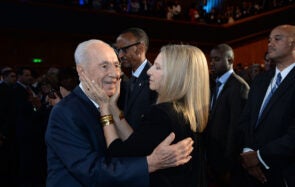After taking a prolonged step back from the public eye, Lena Dunham, the Jewish writer, director and actor behind everybody’s favorite show “Girls,” is So Back.
Last year, she starred in the Holocaust tragicomedy “Treasure.” Her new show “Too Much” premiered on Netflix earlier this summer. Her longtime podcast is, for the first time, being released on major podcasting platforms, and her Substack is quickly becoming very important to me, personally (she recently tapped one of my favorite authors, Dolly Alderton, to recommend a list of books!).
In the latest of Dunham’s accomplishments, filming wrapped this week on “Good Sex,” the Netflix romantic comedy Dunham wrote, directed and produced starring Jewish actress Natalie Portman as a therapist in New York City.
In an Instagram post celebrating the end of filming, Dunham gushed about working with “muse of the century” Natalie Portman. And in that same post, she reflected on the person who made her want to make romcoms in the first place: the one and only Nora Ephron.
“Nora Ephron made me fall in love with romcoms before I’d ever experienced romance. She told me that the best ones always seem to be about love, but really say something about the era in which we live.”
This love fest between Jewish women makes our hearts happy, and it makes us even happier to know that the gushing goes both ways. When Dunham’s first film, “Tiny Furniture,” came out both Ephron and Portman noticed. Ephron even reached out to Dunham, beginning a year-and-a-half long friendship that lasted until Ephron died in 2012.
“I received a short, perfect e-mail from Ephron, saying she had seen and enjoyed my film and would like to take me to lunch,” Dunham wrote in a tribute to Ephron that ran in the New Yorker.
Dunham had looked up to Ephron as a director for years, calling herself “a fan girl, right along with my mother, aunt, grandmother and every other intelligent woman in the tristate area.” In a conversation with Ephron filmed for Criterion, Dunham said, “I was lucky to exist in a world where you exist, and talk about [the difficulties of being a female director].”
When Natalie Portman directed her first film in 2016, “A Tale of Love and Darkness,” based on the book by Israeli author Amos Oz, she cited Dunham as an inspiration, specifically when asked about the tendency for critics to dismiss films directed by female actors as “vanity projects.”
“I remember seeing ‘Tiny Furniture,’ Lena Dunham’s film, and when the credits rolled I started crying,” Portman said to Entertainment Weekly, “because it was written by Lena Dunham, starring Lena Dunham, produced by Lena Dunham and directed by Lena Dunham. This young woman has no fear of [saying] ‘I did it, I did all of this.’ And it was so good.”
To have Lena Dunham directing Natalie Portman in a romcom (a genre perfected by Nora Ephron) is such a beautiful full circle moment — we’re kvelling over it.








